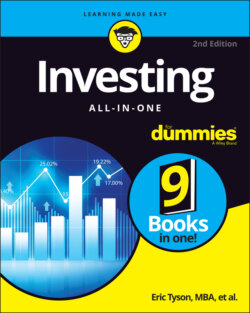Читать книгу Investing All-in-One For Dummies - Eric Tyson - Страница 38
Bond returns
ОглавлениеWhen you buy a bond, you lend your money to the issuer of that bond (borrower), which is generally a government or a corporation, for a specific period of time. When you buy a bond, you expect to earn a higher yield than you can with a money market or savings account. You’re taking more risk, after all. Companies can and do go bankrupt, in which case you may lose some or all of your investment.
Generally, you can expect to earn a higher yield when you buy bonds that
Are issued for a longer term: The bond issuer is tying up your money at a fixed rate for a longer period of time.
Have lower credit quality: The bond issuer may not be able to repay the principal.
Wharton School of Business professor Jeremy Siegel has tracked the performance of bonds and stocks back to 1802. Although you may say that what happened in the 19th century has little relevance to the financial markets and economy of today, the decades since the Great Depression, which most other return data track, are a relatively small slice of time. Figure 2-4 presents the data, so if you’d like to give more emphasis to the recent numbers, you may.
© John Wiley & Sons, Inc.
FIGURE 2-4: A historical view of bond performance: Inflation has eroded bond returns more in recent decades.
Note that although the rate of inflation has increased since the Great Depression, bond returns haven’t increased over the decades. Long-term bonds maintained slightly higher returns in recent years than short-term bonds. The bottom line: Bond investors typically earn about 4 to 5 percent per year.
